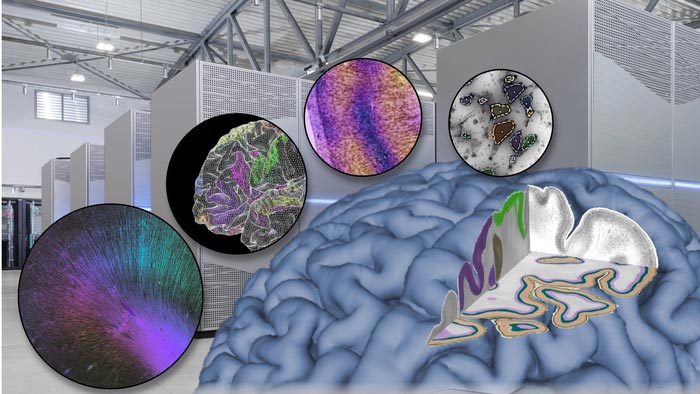Human Brain Project

Types of Big Brain Data and a supercomputer in the background
Credit: Timo Dickscheid, Sascha Kreklau / Forschungszentrum Juelich
Researchers outline in Science how brain research makes new demands on supercomputing.
In the latest issue of Science, Katrin Amunts and Thomas Lippert explain how advances in neuroscience demand high-performance computing technology and will ultimately need exascale computing power.
“Understanding the brain in all its complexity requires insights from multiple scales – from genomics, cells and synapses to the whole-organ level. This means working with large amounts of data, and supercomputing is becoming an indispensable tool to tackle the brain,” says Katrin Amunts, Scientific Director of the Human Brain Project (HBP), Director of the C. and O. Vogt-Institute of Brain Research, Universitätsklinikum Düsseldorf and Director of the Institute of Neuroscience and Medicine (INM-1) at Research Centre Jülich.
“It’s an exciting time in supercomputing,” says Thomas Lippert, Director of the Jülich Supercomputing Centre and leader of supercomputing in the Human Brain Project. “We get a lot of new requests from researchers of the neuroscience community that need powerful computing to tackle the brain’s complexity. In response, we are developing new tools tailored to investigating the brain.”
The human brain contains around 86 billion neurons that form trillions of contact points. Imaging an entire brain at cellular resolutions produces data in the range of several Petabytes; electron microscopy of a whole brain would amount to more than one Exabyte of data. “Brain research, medicine and information technologies face challenges that can only be addressed by joining the forces of all three domains,” says Amunts.
In Europe, the big data challenge of neuroscience is addressed by the Human Brain Project’s research infrastructure EBRAINS. It provides a range of tools, data-, and compute-services to brain researchers. This includes access to supercomputing systems via the Fenix federated Infrastructure, which has been set up by Europe’s leading Supercomputing Centres as part of the Human Brain Project and will serve communities beyond brain research.
Within the next five years, Europe is aiming to deploy its first two exascale supercomputers. They will be acquired by the European High Performance Computing Joint Undertaking (EuroHPC JU), a joint initiative between the EU, European countries and private partners. “The brain research community stands ready to use these exascale systems,” says Amunts.
Journal: Science
Method of Research: Commentary/editorial
Subject of Research: People
Article Title: Brain research challenges supercomputing
Article Publication Date: 25-Nov-2021
Media Contact
Peter Zekert
Human Brain Project
p.zekert@fz-juelich.de
Office: 49-246-161-96860
All latest news from the category: Information Technology
Here you can find a summary of innovations in the fields of information and data processing and up-to-date developments on IT equipment and hardware.
This area covers topics such as IT services, IT architectures, IT management and telecommunications.
Newest articles

Innovative 3D printed scaffolds offer new hope for bone healing
Researchers at the Institute for Bioengineering of Catalonia have developed novel 3D printed PLA-CaP scaffolds that promote blood vessel formation, ensuring better healing and regeneration of bone tissue. Bone is…

The surprising role of gut infection in Alzheimer’s disease
ASU- and Banner Alzheimer’s Institute-led study implicates link between a common virus and the disease, which travels from the gut to the brain and may be a target for antiviral…

Molecular gardening: New enzymes discovered for protein modification pruning
How deubiquitinases USP53 and USP54 cleave long polyubiquitin chains and how the former is linked to liver disease in children. Deubiquitinases (DUBs) are enzymes used by cells to trim protein…



